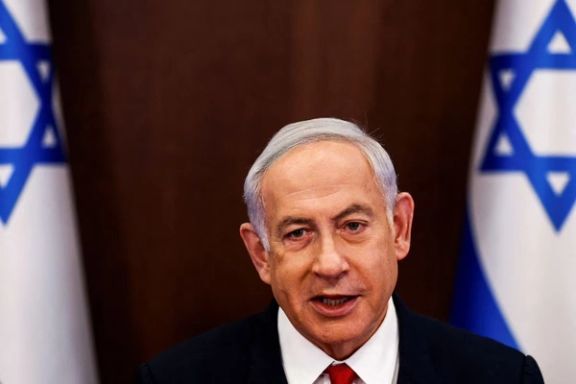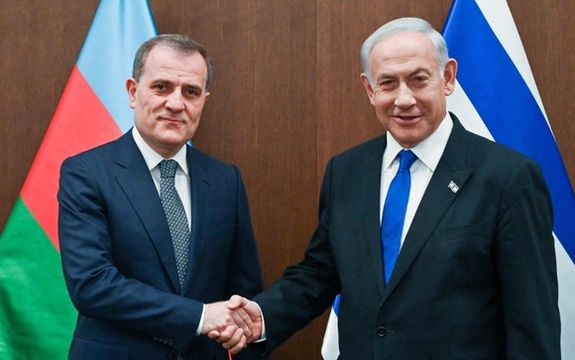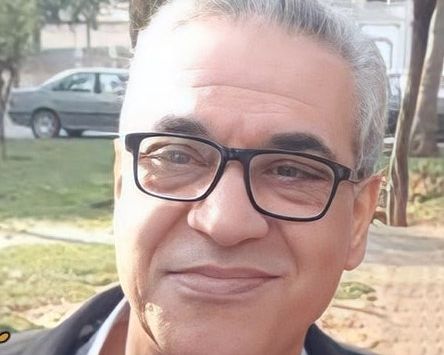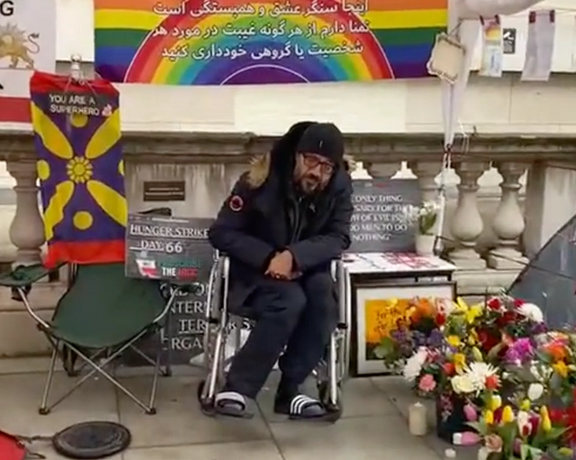We Will Not Allow Iran To Put Noose Of Terror Around Us: Netanyahu

Israeli Prime Minister Benjamin Netanyahu said Sunday he would stop Iran from strangling the Jewish state with a "noose of terror."

Israeli Prime Minister Benjamin Netanyahu said Sunday he would stop Iran from strangling the Jewish state with a "noose of terror."
Speaking at the weekly cabinet meeting, he said the country’s security personnel are “working on this matter around the clock … and we will continue to act both offensively and defensively against the aggression of Iran and its terrorist satellites”.
The Israeli Prime Minister's statements about the aggressions of the Islamic Republic come at a time when Iran’s foreign minister toured Lebanon’s border with Israel Friday during a visit to the Arab nation, and was documented looking out at the Jewish state his regime regards as an archenemy.
After meeting with Hezbollah Secretary General Hassan Nasrallah, Hossein Amir-Abdollahian took the tour along with several Lebanese parliamentarians and members of the Iranian-backed terror group.
“Positive developments in the region will lead to the collapse of the Zionist entity,” he said during his tour.
Mehr state news agency called Amir-Abdollahian's presence at the Israel-Lebanon border a "response" to the move by Israel's foreign minister, who visited Iran's borders during the opening of the country's embassy in Ashgabat, the capital of Turkmenistan.
Meanwhile, an Israeli air attack near the city of Homs hit Iranian targets early Saturday, while Syrian state media reported that some missiles were intercepted.
Meanwhile, Syrian Observatory for Human Rights, based in the United Kingdom, reported that Israeli missiles fired from warplanes destroyed a Hezbollah ammunition depot near Homs airport.

Iran’s rial hit its lowest point in one month on Monday, falling by 10 percent against the US dollar, as sanctions remain in place and the economy is in crisis.
The rial hit a low of 550,000 against the US dollar for the first time since April 1, when an apparent intervention by the Central Bank of Iran (CBI) had brought the rate down to around 500,000 rial for each dollar.
In early 2018, the rial was trading at around 40,000 when former US President Donald Trump decided to pull out of the JCPOA nuclear agreement and impose crippling sanctions on Iran. Since then, the rial has fallen by almost 14-fold.
A series of worker strikes have been underway since April 22, affecting energy, petrochemical, steel and other sectors, as the rial falls and inflation spikes.
Monthly salaries for ordinary workers that were equivalent to $220 one year ago are now around $120 in purchasing power.
An Iranian official said Sunday that workers’ pay covers expenses for just nine days of the month for a small family.
Negotiations in 2021 and 2022 to reach a new nuclear agreement reached a deadline last September, prompting markets to sell off rials. Since then, the currency has lost half its value.
In addition to the nuclear issue, Iran’s supply of weapons to Russia and its brutal and deadly crackdown on anti-government protesters in recent months have made further talks more difficult as the United States demands Iranian policy changes at multiple levels.

Prince Reza Pahlavi and Solidarity for a Free Iran have slammed a letter by 33 Knesset members to Israeli foreign minister Eli Cohen, threatening Iran's territorial integrity.
Following Cohen's recent state visit to Azerbaijan, the Knesset members in a letter delivered to Cohen’s office asked the Israeli government to “pressure Iran to stop oppressing the Azeri minority in northwest Iran” based on a request by the Jewish community in Azerbaijan.
Before a scheduled speech at the Anti-Defamation League, Pahlavi strongly condemnedthe action of the Israeli lawmakers.
“The verbal assault on Iran’s territorial integrity by 32 members of the Israeli parliament is completely unacceptable and a service to the interests of the anti-Iranian Islamic Republic regime.”
Also, in a statement published on Twitter Sunday, the diaspora political group (7th Aban Front in Persian) said the Knesset members’ letter regarding “the Azeri minority” in Iran is “a clear case of action against Iran's existence”.
“Solidarity for a Free Iran considers this letter a hostile act against the Iranian nation and strongly condemns it,” the statement said.
“It is noteworthy that the letter of these Knesset members is in sheer contradiction with the statements made by Israeli government officials regarding friendship between the two nations of Iran and Israel during the recent visit of Prince Reza Pahlavi,” Solidarity for Free Iran said.
Prince Reza Pahlavi, a leading opposition figure, had visited Israel earlier this month and met with Israeli officials including Prime Minister Benjamin Netanyahu. This was the first time a prominent Iranian political figure had paid a public visit to Israel.

The group also stressed its belief in friendly relations with all countries and fighting against “reactionary discourses such as antisemitism” in the post-Islamic Republic Iran and condemned the Iranian regime’s animosity toward Israel but added that they would not allow “any country or political group to take advantage of such principles to spread hate and contentiousness against the Iranian nation.
The Knesset members accused the Iranian regime of “carrying out a policy of cultural genocide by restricting the right of members of the Azeri minority to study and spread its heritage, to teach its language and even to register children with Azeri national names.”
Around a quarter of Iran’s population is Turki-speaking Azari (in Iran the word is Azari – not Azeri), with analysts and activists disagreeing over the closeness of their cultural-linguistic links to their neighbors to the north.
It should be noted that Supreme Leaser Ali Khamenei and many past and current high-ranking Iranian officials come from the Azari community.
The letter said the Jewish community of Azerbaijan is “very concerned” about the persecution of the said ethnic minority in Iran and stressed that the country of Azerbaijan is one of the most important strategic allies of Israel in the region.
“Obtaining international support as broad as possible for the national aspirations of the people of South Azerbaijan (term used by Baku for Iran’s Azarbaijan) will be a fatal blow to the Ayatollah regime, and establishment of the sovereign state of South Azerbaijan,” they wrote.
Supporting the separation of what they called South Azerbaijan from Iran would also be “an appropriate response on the level of political activism to the subversion of the Ayatollah regime” against Israel.
Tensions have been high between Tehran and Baku, an Israeli ally since November 2022 when both sides accused each other of engaging in terrorism and espionage. Tehran has also accused Baku of harboring Israeli intelligence and military elements that plan to use its territory in a possible attack against Iran’s nuclear facilities.
Solidarity for a Free Iran was founded by prominent political activists after a gathering of political and civil activists from the Iranian diaspora in Brussels in late October, less than three months after Mahsa Protests began and spread across the country.

Afif Naimi, one of the former leaders of Iran's persecuted Baha'i community, was arrested by security forces on Saturday.
Baha'i activists say Naimi was spending a holiday with his family and relatives in a resort in Karaj in the outskirts of Tehran, when more than ten security agents entered and arrested him.
The arrest of the Baha'i citizen comes less than four months after his release on bail.
He suffers from heart disease and passed out many times during his previous detention.
This former director of Iran's Baha'i community known as "Yaran" was sentenced to seven years in prison and a fine of fifty billion rials (100,000 USD) by the Karaj Revolutionary Court in February last year. His sentence is now being appealed.
Two other Bahai community leaders Fariba Kamalabadi, 60, and Mahvash Sabet Shahriari, 70, were handed new 10-year sentences in December after having served 10 years previously on charges of threatening national security.
The 1979 constitution of the Islamic Republic recognizes only Islam, Christianity, Judaism and Zoroastrianism. Supreme Leader Ali Khamenei has on several occasions called the Baha'i faith a cult and in a religious fatwa in 2018 forbade contact, including business dealings, with followers of the faith.
Baha'is, who number around 300,000 in Iran, say their rights are systematically violated and they are often harassed, forced to leave their homes and businesses, and are deprived of government jobs and university education.

Iran said Sunday that the first shipment of Chinese cars is about to hit the market while the minister responsible for the country's car industry was impeached over his lackadaisical performance.
According to reports, the shipment was unloaded at Aprin dry port -- an inland intermodal terminal near Tehran directly connected by road or rail to a seaport. This shipment includes 1,108 Changan CS35s and 125 Changan CS55s imported by Iranian automaker Saipa.
Mehdi Zeighami, the director of the car import plan at the Ministry of Industry, Mine and Trade, said on Sunday that the import was finally carried out “after a five-year hiatus.” He did not say if this is anyhow related to the impeachment of Industry Minister Reza Fatemi-Amin, who appeared at the parliament on the same day to defend his ministry’s performance about the car industry. Even if it was a publicity stunt by the ministry, it did not prove to be effective as Fatemi-Amin could not convince the lawmakers and was sacked anyway.

There are a couple of noteworthy points about the plan to import the cars from the Chinese company. The government plans to import about 100,000 cars from one single Chinese state-owned company, Changan Automobile, by the end of the current Iranian year – March 20, 2024. And the entire project will be done by Saipa, one of the Iranian state-owned companies with a monopoly in manufacturing automobiles. The fact that there is no competition in the import project as no businesses can take part in it makes the whole affair more prone to corruption.

For years critics and politicians have criticized the government-controlled auto industry and have referred to a “mafia” running the money-losing and inefficient sector. In 2019, it was revealed that these carmakers owed $9 billion, a considerable sum in Iran, due to corruption and mismanagement. "Widespread financial corruption has turned automakers in Iran into a powerful Mafia," a lawmaker said at the time.
The carmakers are unable to satisfy domestic demand and they keep raising prices. The government has long restricted car imports, turning the country into a vast parking lot of dilapidated cars.
Changan Automobile is the smallest of the "Big Four" state-owned car manufacturers in China with an annual production capacity of about two million units. It is not clear how the Iranian government came to the conclusion to choose this particular company or if the company would be able to supply the promised 100,000 cars in addition to its other supply commitments.
Another crucial question is how Iran is planning to pay for 100,000 cars when it is under US banking sanctions. The answer can be simple: Use oil import money China owes in a cars for fuel barter deal.
First, making people so eager to get one of the long-sought-after imported cars that they sign up for the plan and pay in advance for a nebulous purchase; second, a murky contract between two state-owned companies from Iran and China without providing any details about the total amount of transactions and number of cars; third, cashing on people’s money as the price of cars can be updated and increased with every shipment of cars. The whole affair can easily be a method by the regime, which faces difficulties to access its oil revenues, to barter oil for cars with China and get the money from the nation.

According to Zeighami, the final price of the imported cars will be announced in the coming weeks. The Central Bank of Iran has blocked at least 96 trillion rials ($2 billion) of prospective customer's money in the cars pre-sales scheme without determining the models of the cars, availability, or the final price since early March. Prospective buyers had to deposit at least five billion rials ($10,000) to book the purchase of an imported car and over 120,000 people signed up for the plan.
Now it is apparent that most of the cars will be Changans, although Zeighami claims that 1,500 other cars will also be imported,which will be from other carmakers such as Fiat, Hyundai, Kia and Mitsubishi.
A lawmaker representing Tehran, Somayeh Rafiei, said in a TV show last week that the axed industry minister told her that the total demand for cars in the country is about two million units.
Iran’s two main carmakers – Saipa and Iran Khodro – can only produce 1,400,000 units of light and heavy vehicles, mostly sub-standard older foreign models.
The chairman of the Association of Car Scrapping Centers said last week that currently 14 to 15 million junk vehicles are on the roads, consuming at least 33 million liters of gasoline (8.7 million gallons) a day.
All things considered, the entire car import scheme and the impeachment of the minister seems like a cunning plot by the government.

Thousands of Iranians rallied in support of hunger striker Vahid Beheshti across the world and urged the proscription of the IRGC by Britain and other European countries.
On Saturday, Iranians living in Vancouver, Canada, in solidarity with Vahid Beheshti and workers' strikes in Iran, called for increased international pressure against the Islamic Republic. Activists living in Montreal also held demonstrations in solidarity with Vahid Beheshti.
Similar events were held in Berlin, Frankfort, Bonn, Kassel in Germany and also Vienna, Gothenburg and Milan.
In France, Iranians held a protest in Paris and emphasized the need to designate the IRGC as a terrorist arm of the Islamic Republic.
Thousands of others marched in London to 10 Dawning Street to ask the UK to proscribe Iran's Revolutionary Guards (IRGC) as a terrorist organization.
The protest rally was attended by activist Vahid Beheshti who has been on a hunger strike in London since February 23 outside the UK Foreign Office to raise awareness for the need to designate the IRGC.
He said he will not back down "even a millimeter from my position" as he risked his well-being for the sake of freedom of speech and human rights.
He said the voice of the huge crowd of Iranians in front of the British Prime Minister's office in London made the UK authorities realize the need to proscribe the IRGC as a terrorist organization.
Several other Iranians have joined Beheshti’s protest action in the past weeks and set up their tents for a sit-in in front of the Foreign Office building.